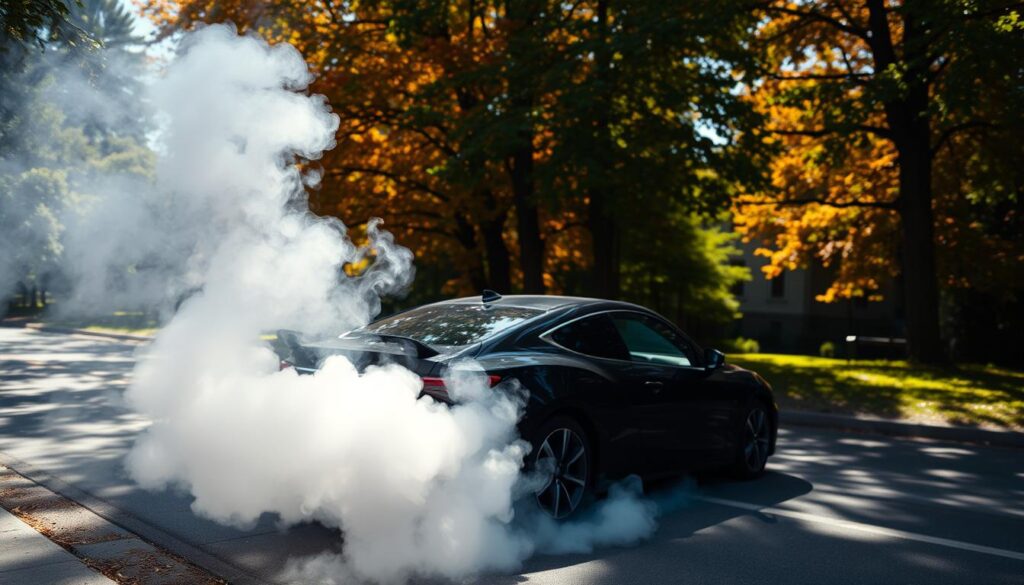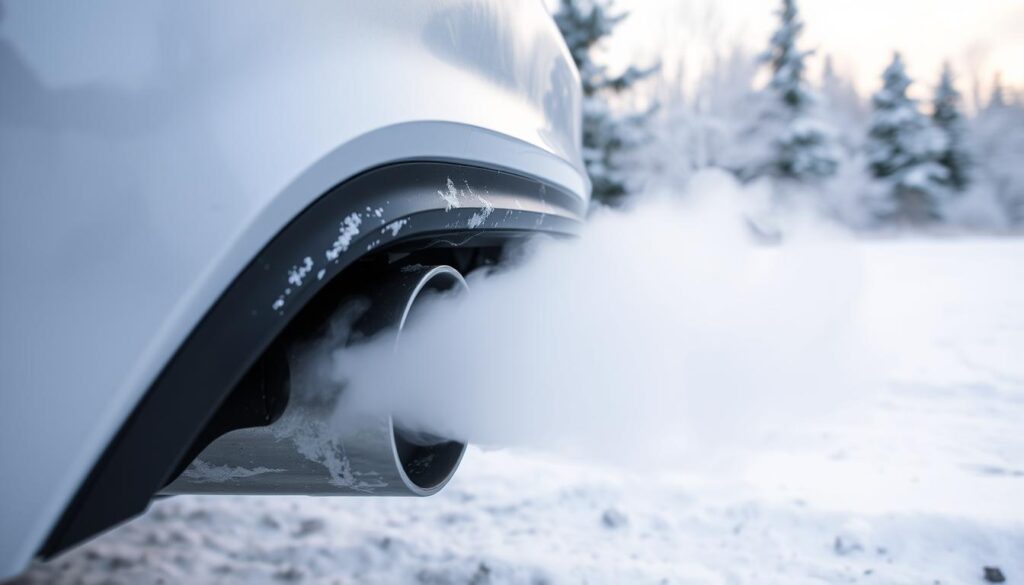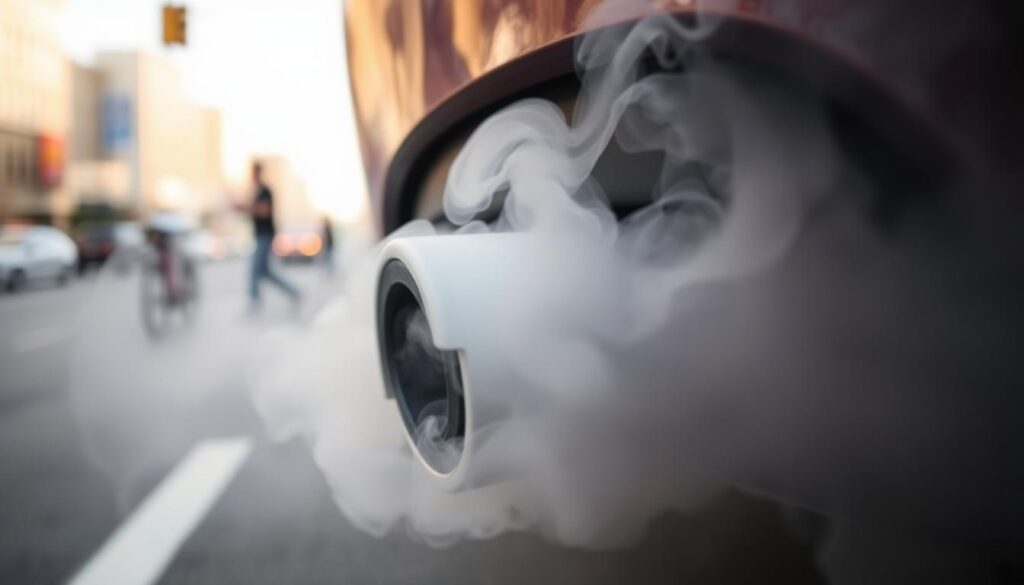Ever seen white smoke coming from your car’s exhaust? It’s a sign of a big problem with your engine. You need to fix it fast to avoid more damage. White smoke can mean a blown head gasket, coolant leaks, or a cracked engine block.
It’s key to know why you’re seeing white smoke from your exhaust. This article will cover the main reasons. We’ll talk about engine problems and how to fix them. This will help you find and solve the issue.
Table of Contents
Understanding White Smoke from Exhaust: A Basic Overview
Seeing white smoke from your car‘s exhaust can worry you. It’s important to know what it means. White smoke often points to serious problems like a blown head gasket or a cracked engine block. To fix it, you first need to find out why it’s happening.
Smoke colors in the exhaust tell you different things. Blue smoke means oil is burning, while black smoke suggests too much fuel. White smoke, however, usually means coolant is burning in the engine. It’s key to fix this fast to prevent more damage.
What White Smoke Actually Indicates
White smoke can come from many issues, like a bad head gasket, coolant leaks, or a cracked engine block. If you see white smoke, get your car checked by a mechanic right away.
Different Types of Exhaust Smoke Colors
The color of the smoke can hint at engine problems. Here’s what each color usually means:
- Blue smoke: oil burning
- Black smoke: rich fuel mixture
- White smoke: coolant burning in the engine
When to Be Concerned About White Smoke
Seeing white smoke means you should act fast. Waiting too long can harm your engine more. By understanding white smoke and fixing the problem, you can avoid more damage and keep your car running well.
Common Causes of White Smoke from Car Exhaust
When a car smokes from exhaust, it’s a big problem. A blown head gasket is a common reason for engine white smoke. It lets coolant into the engine, causing white smoke.
Coolant leaks can also make the engine smoke white. This happens when coolant burns inside the engine. It’s important to fix these issues fast to keep the engine safe.
Cracked engine blocks can also cause white smoke. They let coolant into the engine. Signs of these problems include:
- White smoke coming from the exhaust pipe
- Decreased engine performance
- Increased fuel consumption
Regular checks can catch these problems early. If you see car smoking from exhaust, get it checked by a mechanic. They can find the cause and fix it.
Knowing why engine white smoke happens helps keep your car’s engine running well. Always keep up with maintenance and inspections. This way, your car will run smoothly and avoid expensive repairs.
The Head Gasket Connection: A Major Culprit
Seeing white smoke from your car’s tailpipe can be a big worry. A blown head gasket is often the cause. This part is key to your engine’s health, and a failure can lead to white smoke.
So, what are the signs of a blown head gasket? Some common indicators include:
- White smoke coming from the tailpipe
- Overheating engine
- Decrease in engine performance
Head gaskets can fail for many reasons, like overheating or engine wear. When this happens, coolant leaks into the engine, causing white smoke.
Fixing a blown head gasket can cost a lot, from a few hundred to several thousand dollars. The price depends on the damage and your car’s type. It’s important to fix it quickly to prevent more engine damage.
In some cases, you might need to replace the head gasket, repair it, or even swap out the engine. Always get a professional mechanic’s advice. They can help figure out the best fix and make sure it’s done right.
| Repair Option | Cost |
|---|---|
| Replacing the head gasket | $500-$2,000 |
| Repairing the head gasket | $300-$1,500 |
| Replacing the engine | $2,000-$5,000 |
Coolant Leaks and Their Impact on Exhaust
Coolant leaks can cause white smoke from your car’s exhaust. This happens when coolant gets into the engine and burns, creating white smoke. Issues like a cracked radiator, a faulty water pump, or leaks in coolant hoses can lead to this problem.
Some common causes of coolant leaks include:
- Cracked or damaged radiator
- Failed water pump
- Leaky coolant hoses
It’s important to fix coolant leaks quickly. This prevents more damage to your engine and stops white smoke from coming out.
Regular checks and maintenance can spot coolant leaks early. This helps avoid engine damage and white smoke. Knowing why white smoke happens lets car owners fix the problem and keep their car running well.

In short, coolant leaks are a big reason for white smoke from your car’s exhaust. It’s key to fix them fast to protect your engine. By knowing the reasons for white smoke and keeping up with maintenance, car owners can prevent this issue and keep their vehicle in top shape.
| Cause of Coolant Leak | Effect on Engine |
|---|---|
| Cracked Radiator | Engine overheating, damage to engine components |
| Failed Water Pump | Engine overheating, damage to engine components |
| Leaky Coolant Hoses | Engine overheating, damage to engine components |
Cracked Engine Block: A Serious Concern
A cracked engine block is a serious issue that can cause a car to emit white smoke from its exhaust. This problem needs immediate attention to prevent more damage to the engine. If you’re wondering how to fix white smoke from exhaust, it’s key to know the symptoms and how to diagnose them.
Symptoms of a Cracked Block
Symptoms of a cracked engine block include white smoke from the exhaust, overheating, and a drop in engine performance. These signs can be scary and may show a serious engine problem.
Diagnostic Methods
Diagnostic methods for a cracked engine block include a visual check, a compression test, and a leak-down test. These tests help figure out the damage’s extent and the best repair plan.
Some common diagnostic methods include:
- Visual inspection of the engine block and cylinder head
- Compression test to check for leaks in the engine
- Leak-down test to identify the source of the leak
Repair vs. Replace Decision
The choice to repair or replace the engine block depends on the damage’s extent and repair costs. Sometimes, fixing the engine block is cheaper, while other times, it’s better to replace it. It’s crucial to talk to a professional mechanic to decide the best option for your vehicle.
| Symptom | Diagnostic Method | Repair/Replace |
|---|---|---|
| White smoke from exhaust | Visual inspection, compression test | Repair or replace engine block |
| Overheating | Leak-down test, compression test | Repair or replace engine block |
| Decrease in engine performance | Visual inspection, compression test | Repair or replace engine block |
Cold Weather and White Smoke: What’s Normal?
When it gets cold, you might see engine white smoke from your car’s exhaust. This usually happens when you first start the car. It’s because water vapor in the exhaust system condenses. Once the engine warms up, the white smoke usually goes away.
If the car smoking from exhaust keeps happening or if your car overheats, it’s a sign of a bigger problem. You should look into it to find out what’s wrong.
In cold weather, engines don’t work as well. This means they make more water vapor. When this vapor comes out of the exhaust, it turns into tiny droplets. This looks like white smoke. But, it’s usually okay and doesn’t mean your car is broken.
Here are some things to think about:
- Cold engines make more water vapor
- Water vapor in the exhaust system turns into white smoke
- If the white smoke doesn’t go away or if other problems show up, it might be a bigger issue
Keep an eye on how your car acts. If you’re worried about engine white smoke or car smoking from exhaust, check your owner’s manual. Or talk to a mechanic for advice.

Diagnosing White Smoke Issues at Home
White smoke from your tailpipe means you have a problem that needs fixing. Start by looking at your engine and exhaust system. Check for damage or wear, like a cracked radiator or coolant hose leaks.
Doing a visual check can show you obvious damage. You can also do simple tests like a compression test or leak-down test. These tests help you understand your engine’s health and find the problem.
Visual Inspection Steps
- Check the radiator and coolant hoses for any signs of damage or leaks
- Look for any signs of wear or damage on the engine and exhaust system
- Check the oil and coolant levels to make sure they are at the recommended levels
Simple Tests You Can Perform
Along with a visual check, you can do simple tests. A compression test checks the engine’s cylinders. A leak-down test finds leaks in the engine or exhaust system.
When to Use Diagnostic Tools
If the problem is tricky, you might need diagnostic tools. Tools like a scan tool or pressure test kit can provide detailed info. They help you make a precise diagnosis.
Professional Diagnostic Methods and Tools
Professional mechanics use many tools to find why cars have white smoke from the exhaust. They might use a scan tool to look for error codes. They also use a pressure test kit to find leaks in the engine and a leak-down test kit for cylinder issues.
Looking at the engine and exhaust system is key. Mechanics check for wear or damage on parts like the head gasket and piston rings. They also search for blockages or leaks in the exhaust system.
Some common tools used by pros include:
- Scan tools to check for error codes
- Pressure test kits to identify leaks in the engine
- Leak-down test kits to determine issues with the engine’s cylinders
- Visual inspections of the engine and exhaust system
Regular maintenance and inspections can help prevent white smoke from exhaust issues. Finding and fixing problems early can save money on repairs later.
With these tools, mechanics can quickly find and fix white smoke problems. This helps get cars running smoothly again.
Prevention Tips and Regular Maintenance
Regular maintenance is key to preventing white smoke from exhaust. To avoid a car emitting white smoke, it’s essential to stay on top of your vehicle’s upkeep. This includes checking the engine oil regularly and ensuring the coolant level is adequate. By doing so, you can help prevent issues that may lead to how to fix white smoke from exhaust problems.
A well-maintained vehicle is less likely to experience issues that cause white smoke. Some tips to keep in mind include:
- Regularly inspecting the exhaust system for any signs of damage or wear
- Checking the engine oil and coolant levels regularly
- Avoiding extreme temperatures and driving conditions
Being aware of warning signs, such as overheating or a decrease in engine performance, can also help you address any issues promptly. By taking preventative measures and staying on top of maintenance, you can reduce the likelihood of your car emitting white smoke and avoid the need to figure out how to fix white smoke from exhaust.
By following these tips and staying committed to regular maintenance, you can help keep your vehicle running smoothly and prevent white smoke from exhaust. Remember, prevention is key, and taking the time to properly maintain your vehicle can save you time and money in the long run.
| Maintenance Task | Frequency |
|---|---|
| Oil Change | Every 5,000 miles |
| Coolant Check | Every 3,000 miles |
| Exhaust System Inspection | Every 12,000 miles |
Cost Implications of White Smoke Repairs
The cost to fix engine white smoke problems can change a lot. It depends on what’s wrong and how bad it is. Sometimes, fixing it is easy, like swapping out a bad water pump or fixing a coolant hose leak. This can stop car smoking from exhaust.
Here’s a closer look at what fixing engine white smoke might cost:
- Replacing a faulty water pump: $500-$1,000
- Repairing a leak in the coolant hoses: $200-$500
- Replacing the engine or engine block: $2,000-$5,000 or more
It’s key to fix car smoking from exhaust fast to avoid bigger problems and high repair bills later. Keeping up with regular checks and maintenance can spot issues early. This can lower the chance of engine white smoke and the costs that come with it.
Knowing what fixing engine white smoke might cost helps car owners plan and save for repairs. This way, they can handle car smoking from exhaust issues without breaking the bank.
Conclusion: Taking Action on White Smoke Issues
Addressing white smoke from exhaust is key to keeping your vehicle running well. Knowing the causes of white smoke from car exhaust helps you fix problems early. This includes issues like a blown head gasket, coolant leaks, or a cracked engine block.
Regular car checks and quick fixes can stop these problems. If you see white smoke from the exhaust, get a trusted mechanic’s help right away. They can find the problem and fix it, saving you from expensive and risky engine damage.
Fixing white smoke from exhaust issues is good for your car, your safety, and the environment. By acting fast and being careful, you keep your car in top shape and protect your investment.






